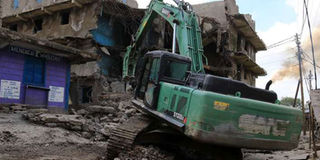Kenya adopts new building regulations

An excavator brings down a building in Mathare Area A that was earmarked for demolition, on May 17, 2016. New building standards that have been adopted are expected to promote harmony and enhance safety in a sector that has recently been in the news following collapse of buildings leading to death and destruction. PHOTO | JEFF ANGOTE | NATION MEDIA GROUP
What you need to know:
- Mr Ongwae said this would enable Kenyan engineers to compete globally with their peers who use the Eurocode standards in all their projects.
- The standards are meant to avert disasters and offer mitigative measures as well as enable firms to obtain finance and insurance.
Professionals in the construction industry will undergo retraining after the government approved discarding of the British standards in favour of European norms now in use globally.
The latter demands uniformity in structural design of buildings and other civil engineering works including, geotechnical aspects, and structural features.
They are also preferred as they promote greater transparency in design methods and will ease communication between designers, authorities and clients.
Kenya Bureau of Standards (Kebs) Managing Director Charles Ongwae said Moi University had agreed to undertake the retraining, expected to take five years, before being certified as Eurocode compliant.
The university is developing a curriculum that will be used for the training.
The standards are also expected to promote harmony and enhance safety in a sector that has recently been in the news following collapse of buildings leading to death and destruction.
Kebs said retraining for structural engineers and other players will start next year and will be carried out in batches across the country.
Mr Ongwae said this would enable Kenyan engineers to compete globally with their peers who use the Eurocode standards in all their projects.
“The British Standards Institute is currently undertaking the replacement of its codes to the structural Eurocode and Kenya risks being left using obsolete British standards and codes of practice that will no longer be relevant,” he said.
Kebs said all stakeholders would be engaged at all stages to ensure a smooth transition.
The Eurocode will benefit construction professionals by enabling them to bid and take up contracts beyond Kenyan borders.
The standards are meant to avert disasters and offer mitigative measures as well as enable firms to obtain finance and insurance.
They allow innovation and use of alternative technology.
“The Eurocode improves the functioning of the single market for products and engineering services where marketing and use of construction products, components and kits is facilitated through a single attestation of conformity, which will be valid in Kenya and other regional member states using them,” Mr Ongwae said.
According to Kebs, come 2021, no product that does not conform to Eurocode will be allowed in the market.





